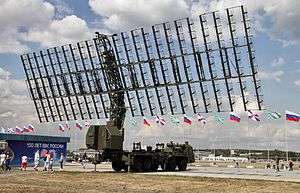Nizhny Novgorod Research Institute of Radio Engineering
The Nizhny Novgorod Research Institute of Radio Engineering (NNIIRT) is a Russian electronics company specializing in the development and manufacturing of radar equipment. It is a subsidiary of the Almaz-Antey group.[1]
 | |
| Open joint-stock company | |
| Founded | 1947 |
| Headquarters | , Russia |
| Parent | Almaz-Antey |
| Website | nniirt |

History
Founded in 1947, NNIIRT is based in the city of Nizhny Novgorod.[2]
Beginning in 1975, NNIIRT developed the first VHF 3D radar capable of measuring height, range, and azimuth to a target. This effort produced the 55Zh6 'Nebo' VHF surveillance radar, which passed acceptance trials in 1982.[3]
In the post–Cold War era, NNIIRT developed the 55Zh6 Nebo U 'Tall Rack' radar, which has been integrated with the SA-21 anti-aircraft weapons system. This system is deployed around Moscow.[4]
In 2013, NNIIRT announced the further development of the 55Zh6UME Nebo-UME, which combines VHF and L band radars on a single assembly.[5][6]
NNIIRT designed air surveillance radars
The Nizhny Novgorod Research Institute of Radio Engineering (Russian acronym: NNIIRT) has since 1948 developed a number of radars.[7] These were mainly radars in the VHF-band, and many of which featured developments in technology that represented "first offs" in the Soviet Union.
Innovations include the first Soviet air surveillance radar with a circular scan; the P-8 Volga (NATO: KNIFE REST A) in 1950, the first 3D-radar; the 5N69 Salute (NATO: BIG BACK) in 1975, and in 1982 the first VHF-band 3D-radar; the 55Zh6 Nebo (NATO: TALL RACK).
Other innovations were radars with frequency hopping; the P-10 Volga A (NATO: KNIFE REST B) in 1953, radars with transmitter signal coherency and special features like moving target indicator (MTI); the P-12 Yenisei (NATO: SPOON REST) in 1955, as well as the P-70 Lena-M with chirp signal modulation in 1968.[8]
| Radar | NATO reporting name | Radio spectrum (NATO) | Developed | Production plant | Notes |
|---|---|---|---|---|---|
| P-3 | VHF | 1948 | NITEL[9] | The first Soviet post-World War II air surveillance radar | |
| P-8 Volga | KNIFE REST A | VHF | 1950 | NITEL[10] | The first Soviet radar with circular scan |
| P-10 Volga A | KNIFE REST B | VHF | 1953 | NITEL[10] | Frequency hopping |
| P-12 Yenisei | SPOON REST | VHF | 1955 | NITEL[10] | Coherent radar with MTI |
| P-14 Lena | TALL KING | VHF | 1959 | NITEL[11] | |
| P-70 Lena-M | VHF | 1968 | First Soviet radar with chirp | ||
| P-18 Terek | SPOON REST D | VHF | 1970 | NITEL[12] | |
| 5N84A Oborona-14 | TALL KING C | VHF | 1974 | NITEL[11] | |
| 5N69 Salute | BIG BACK | D-band | 1975 | First Soviet 3D-radar | |
| 44Zh6 | TALL KING B | VHF | 1979 | NITEL[11] | Stationary version of Oborona-14 |
| 55Zh6 Nebo | TALL RACK | VHF | 1982 | NITEL[13] | First Soviet meter-wavelength 3D-radar |
| 1L13 | 1982 | ||||
| 52E6 | VHF | 1982–1996 | |||
| 1L13-3 Nebo-SV | BOX SPRING | VHF | 1985 | NITEL[14] | |
| 55ZH6U Nebo-U[15] | TALL RACK | VHF | 1992 | NITEL[16] | |
| 1L119 Nebo-SVU | VHF | 1997–2006 | |||
| 59N6-1 Protivnik-G1[17] | D-band | 1997 | Average time between failures 840 hours | ||
| 1L122 Avtobaza[18] | D-band | 1997–2006 | |||
| 52E6MU[19] | VHF | 1997–2006 | |||
| P-18 modernisation kits | SPOON REST D | VHF | 1997–2006 | ||
| 55ZH6M Nebo-M[20] | VHF/multi-band | 2011 | |||
| 59N6M | |||||
References
- "Сайт раскрытия информации СКРИН". disclosure.skrin.ru. Retrieved 16 April 2017.
- "Nizhniy Novgorod Scientific Research Institute for Radio Engineering". Aviation Week. Archived from the original on 2016-03-04. Retrieved 2014-09-28.
- A. Zachepitsky (June 2000). "VHF (Metric Band) Radars from Nizhny Novgorod Research Radiotechnical Institute". Aerospace and Electronic Systems Magazine. IEEE. 15 (6): 9–14. doi:10.1109/62.847925.
- Carlo Kopp (April 2010). "Evolving technological strategy in advanced air defense systems". Joint Force Quarterly.
- Miroslav Gyürösi (14 October 2013). "NNIIRT develops new dual-frequency early warning radar". Jane's Information Group. Archived from the original on 6 October 2014.
- Carlo Kopp and Bill Sweetman. "New Russian Airpower Efforts Show Progress" Aviation Week & Space Technology, 19 June 2012. Archived July 15, 2015, at the Wayback Machine
- "NNIIRT". Retrieved 1 March 2016.
- "Soviet Radars".
- "РЛС П-3А (Dumbo)". Retrieved 7 March 2016.
- "Из истории выпуска РЛС П-18". Retrieved 7 March 2016.
- "РЛС П-14 (TALL KING)". Retrieved 7 March 2016.
- "pvo.guns.ru/rtv/nitel/p18.htm". Retrieved 7 March 2016.
- "РЛС 55Ж6". Retrieved 7 March 2016.
- "РЛС 1Л13 "НЕБО-СВ"". Retrieved 7 March 2016.
- "Rusi Events". 2013-11-06. Retrieved 2 March 2016.
- "Основная деятельность". Retrieved 7 March 2016.
- Kopp, Carlo (2007-09-10). "59N6": 1. Cite journal requires
|journal=(help) - "1L122". Archived from the original on 2017-05-20. Retrieved 2019-03-16.
- Gyűrösi, Miroslav (2009-11-20). "APA-52E6MU-Struna": 1. Retrieved 2 March 2016. Cite journal requires
|journal=(help) - "ВКС РФ получили пять станций для обнаружения стелс-самолетов | Еженедельник "Военно-промышленный курьер"". vpk-news.ru. Retrieved 17 December 2017.